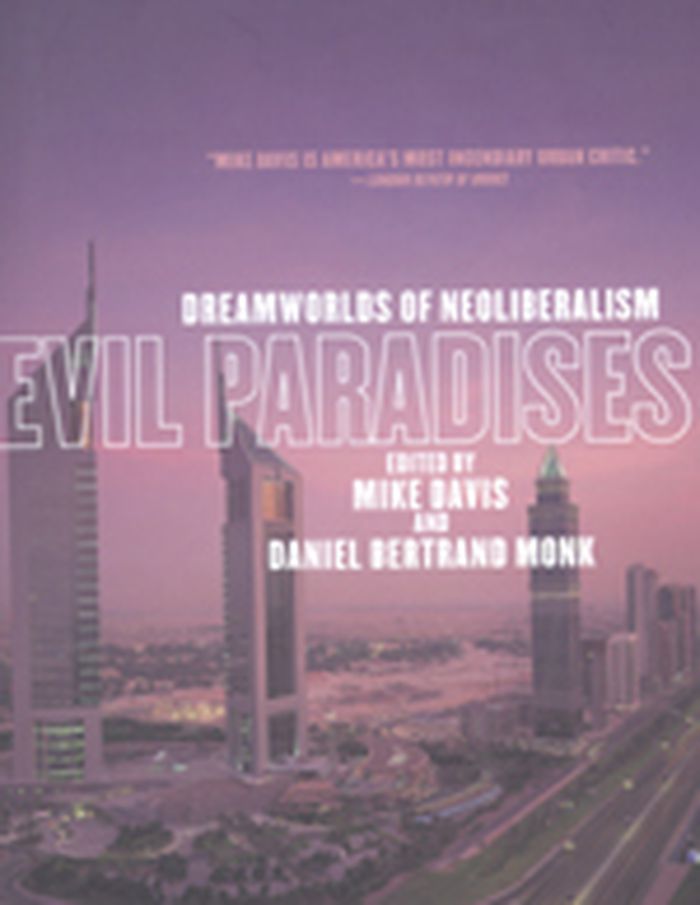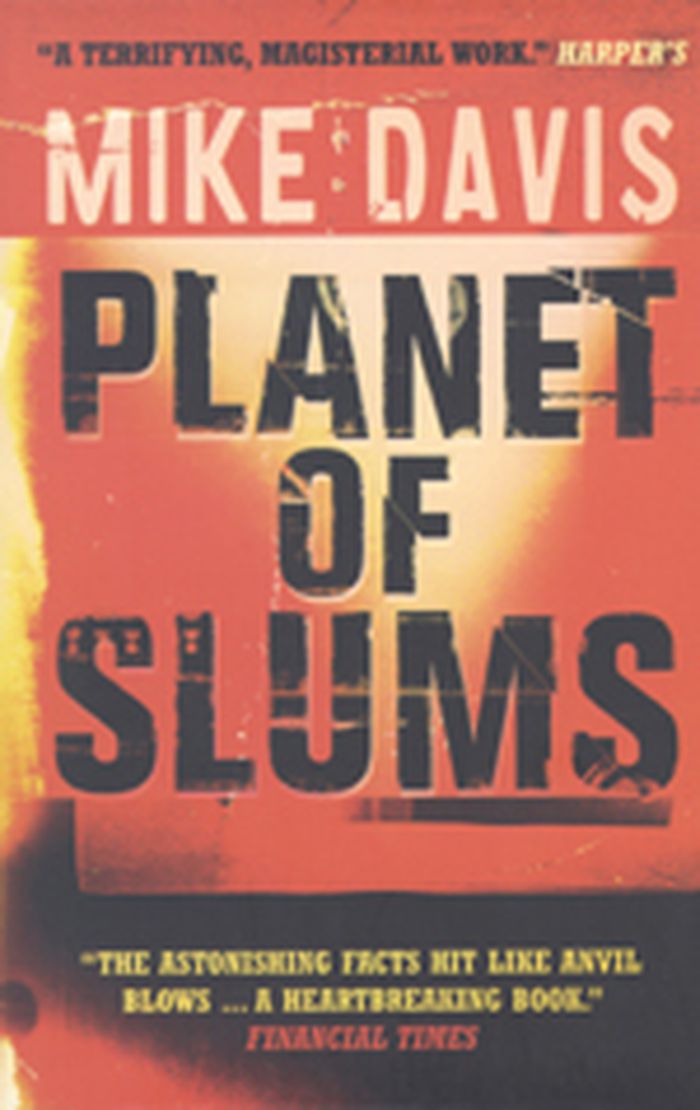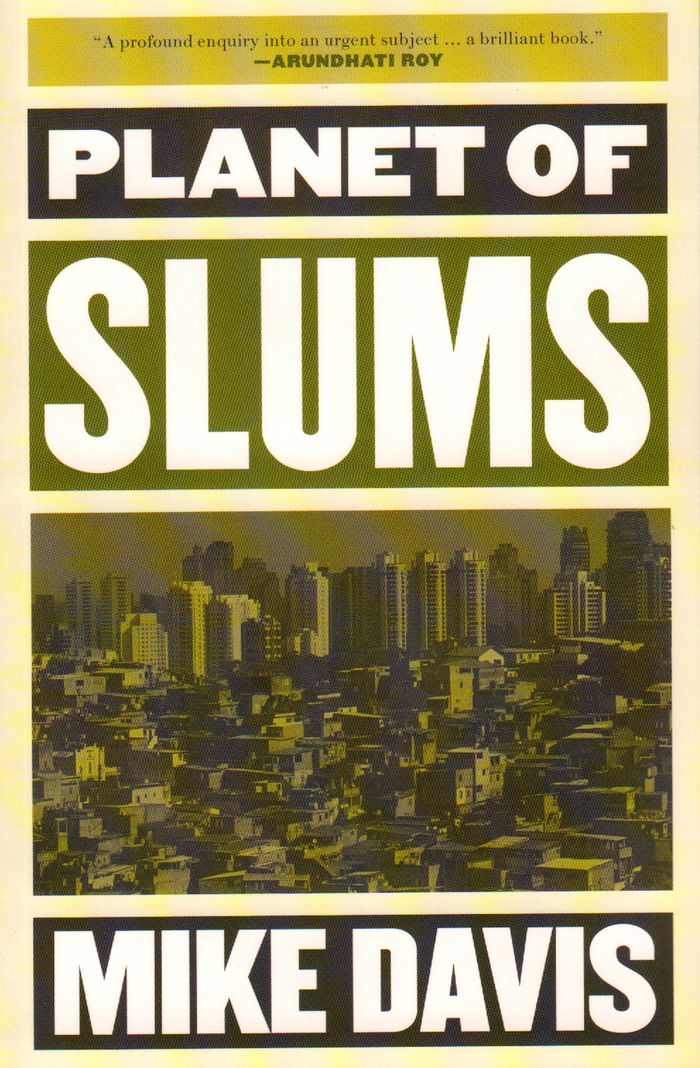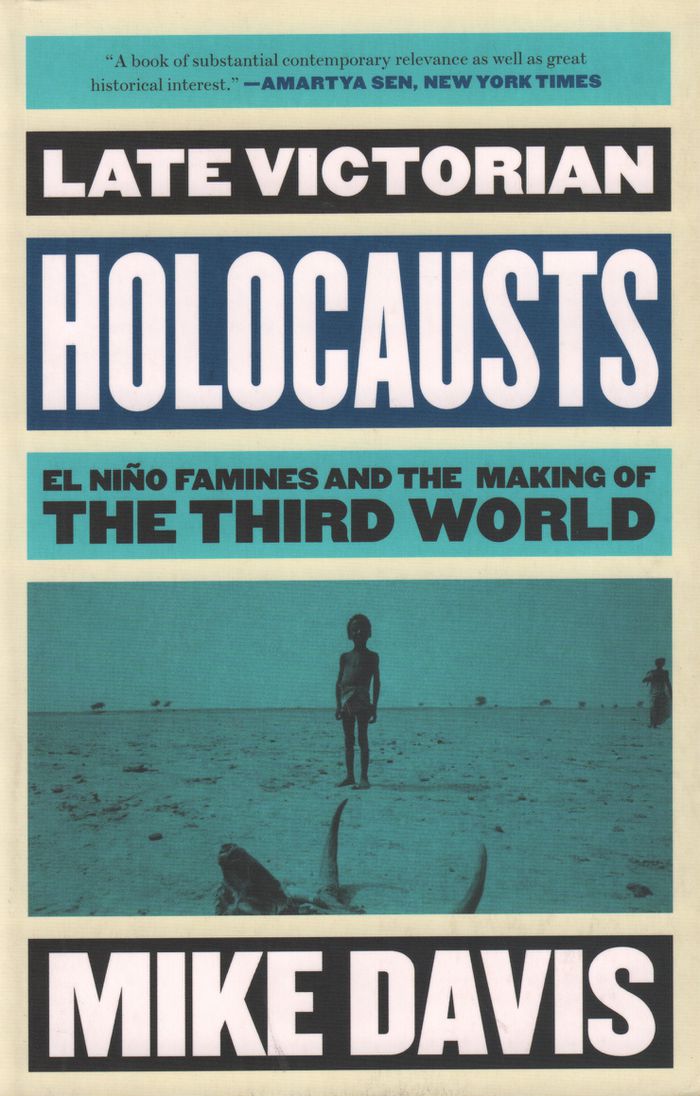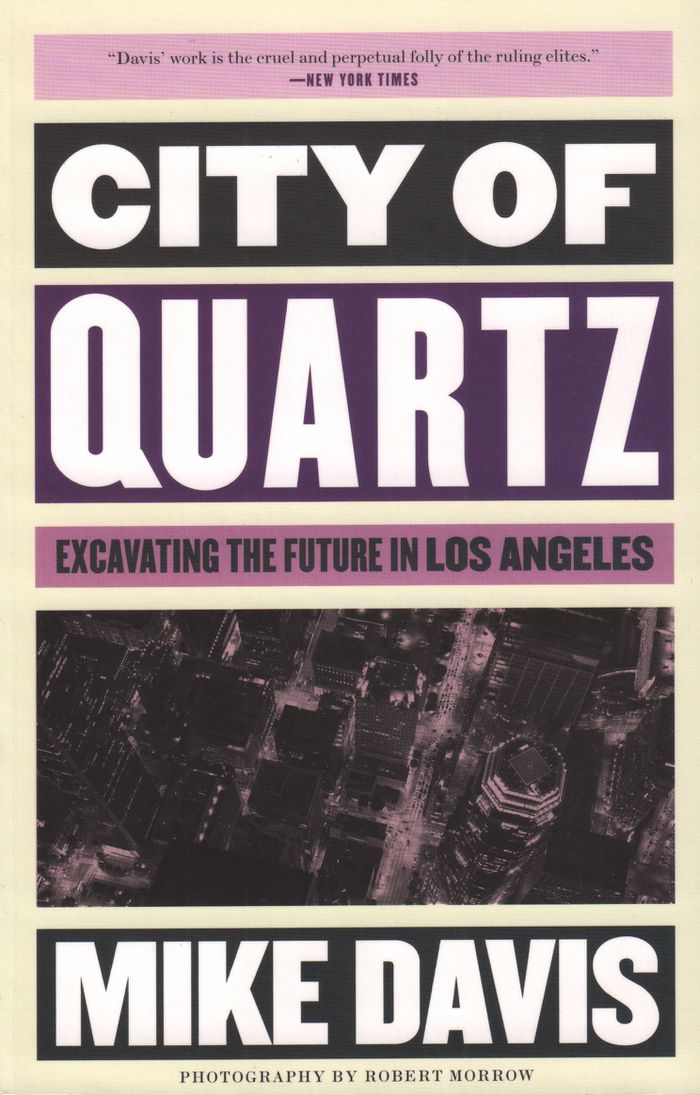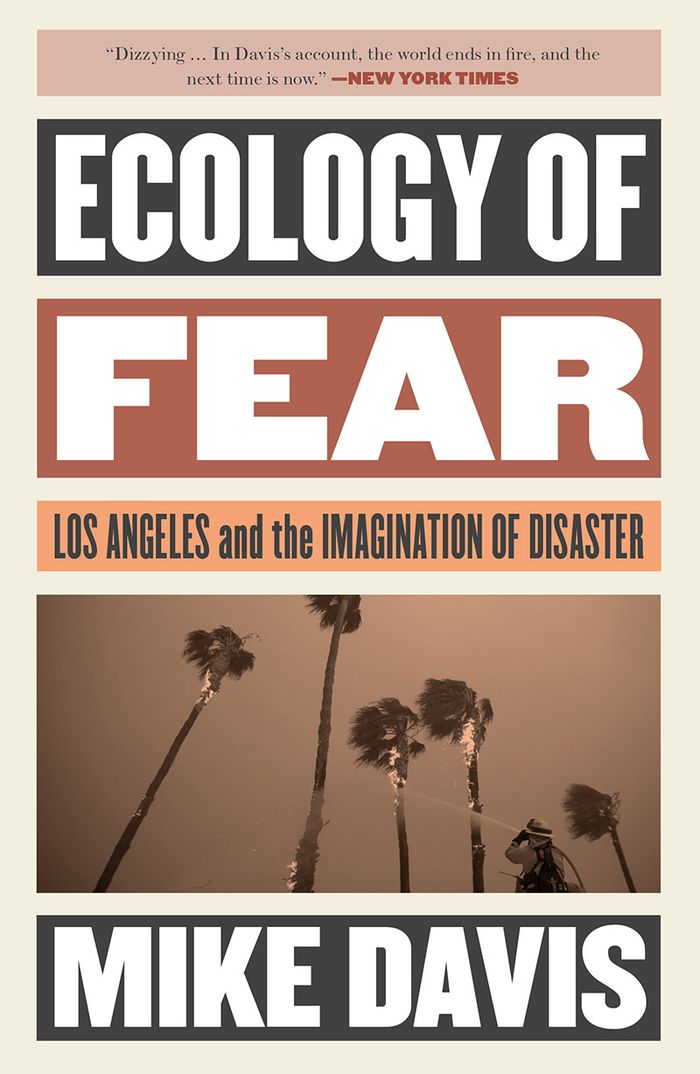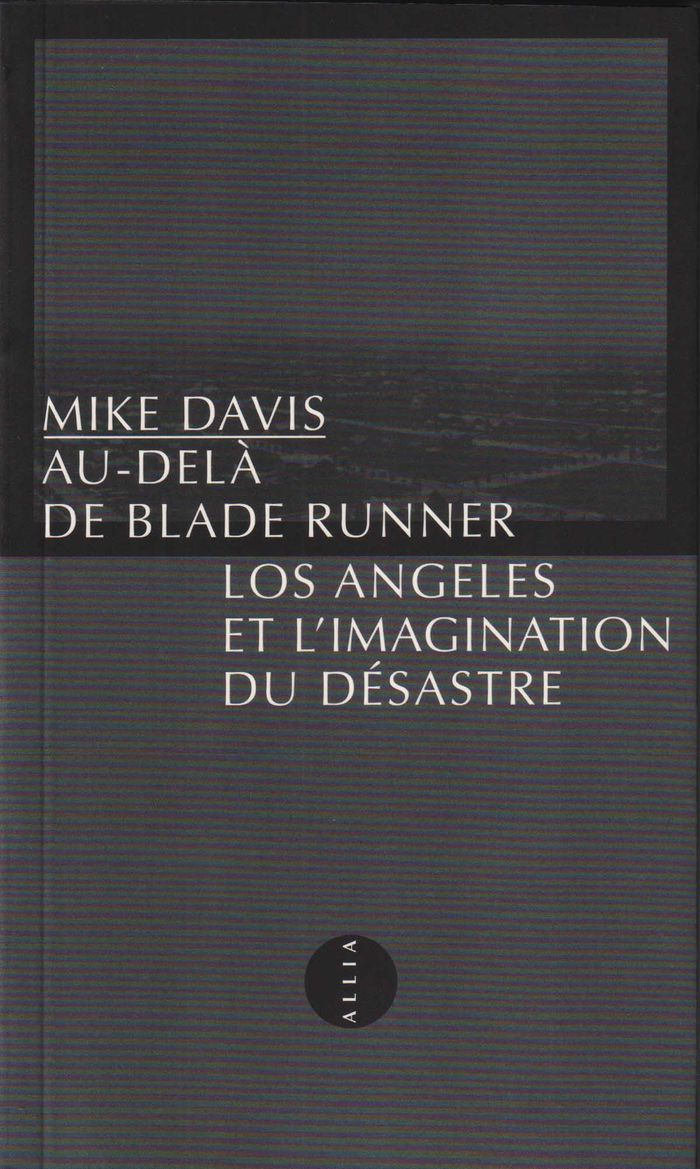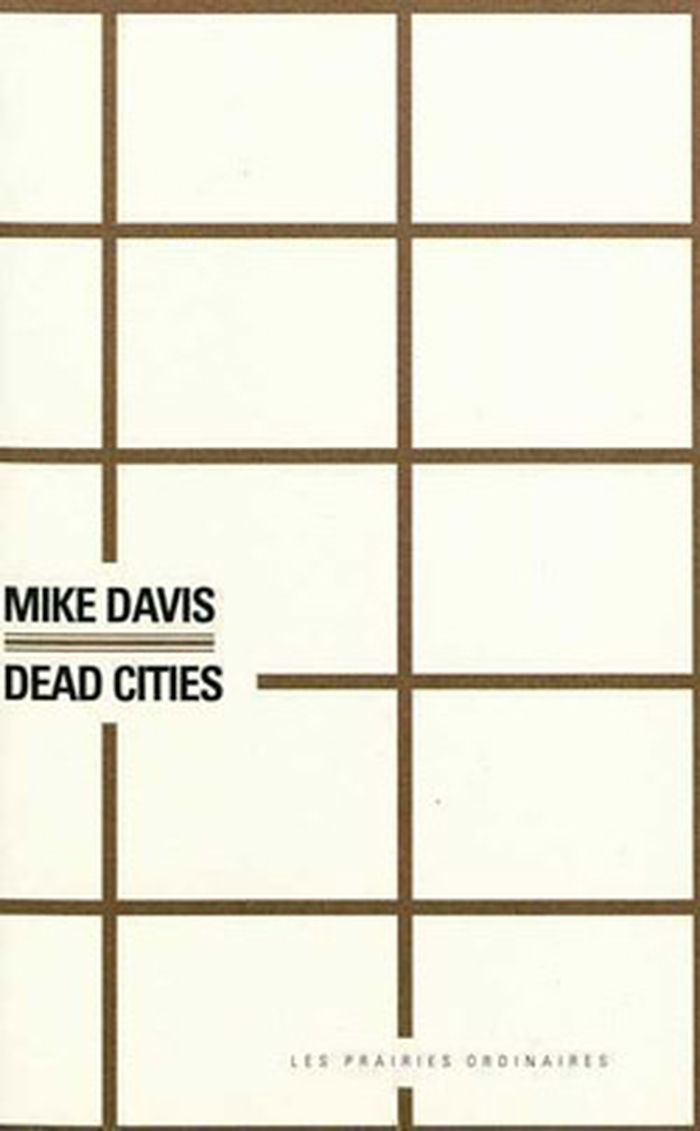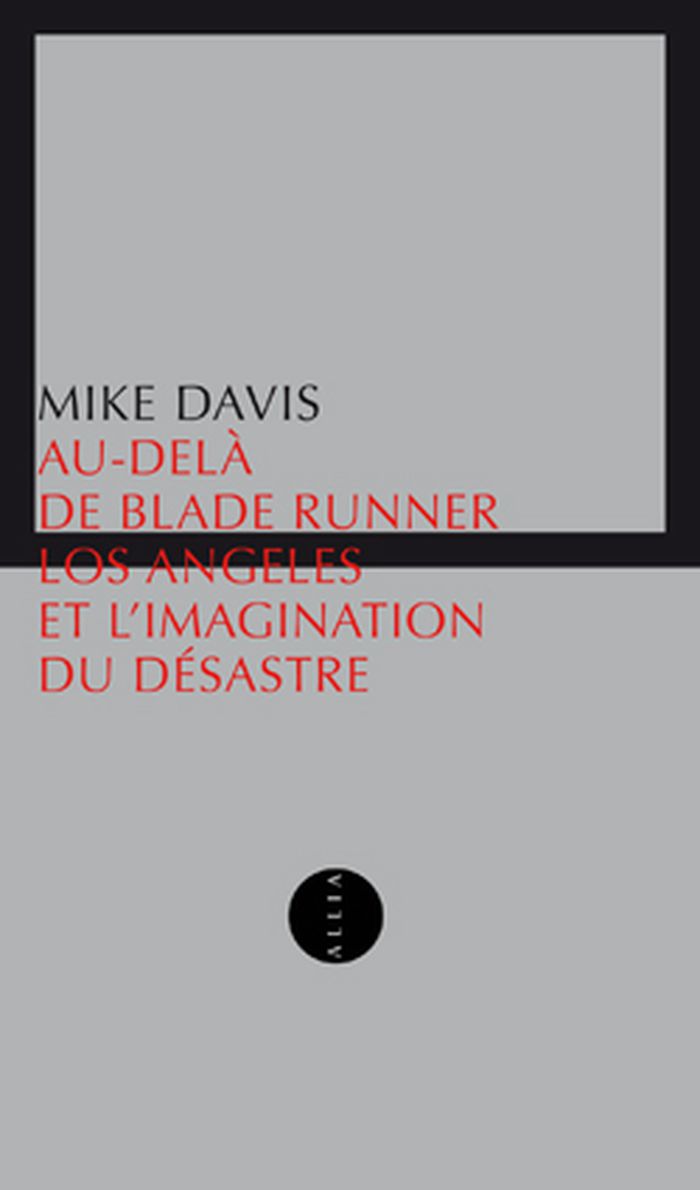$27.95
(disponible sur commande)
Résumé:
Evil Paradises, edited by Mike Davis and Daniel BertrandrnMonk, is a global guidebook to phantasmagoric but real places—alternaternrealities being constructed as “utopias” in a capitalist era unfetteredrnby unions and state regulation. These developments—in cities, deserts,rnand in the middle of the sea—are worlds where consumption andrninequality surpass our worst nightmares.
Théorie de l’urbanisme
juin 2007, New York
Dreamworlds of Neoliberalism : Evil Paradises
Actions:
Prix:
$27.95
(disponible sur commande)
Résumé:
Evil Paradises, edited by Mike Davis and Daniel BertrandrnMonk, is a global guidebook to phantasmagoric but real places—alternaternrealities being constructed as “utopias” in a capitalist era unfetteredrnby unions and state regulation. These developments—in cities, deserts,rnand in the middle of the sea—are worlds where consumption andrninequality surpass our worst nightmares.
Théorie de l’urbanisme
Planet of slums
$25.00
(disponible sur commande)
Résumé:
Urban theorist Davis takes a global approach to documenting the astonishing depth of squalid poverty that dominates the lives of the planet's increasingly urban population, detailing poor urban communities from Cape Town and Caracas to Casablanca and Khartoum. Davis argues health, justice and social issues associated with gargantuan slums (the largest, in Mexico City, has(...)
Planet of slums
Actions:
Prix:
$25.00
(disponible sur commande)
Résumé:
Urban theorist Davis takes a global approach to documenting the astonishing depth of squalid poverty that dominates the lives of the planet's increasingly urban population, detailing poor urban communities from Cape Town and Caracas to Casablanca and Khartoum. Davis argues health, justice and social issues associated with gargantuan slums (the largest, in Mexico City, has an estimated population of 4 million) get overlooked in world politics: "The demonizing rhetorics of the various international 'wars' on terrorism, drugs, and crime are so much semantic apartheid: they construct epistemological walls around gecekondus, favelas, and chawls that disable any honest debate about the daily violence of economic exclusion." Though Davis focuses on individual communities, he presents statistics showing the skyrocketing population and number of "megaslums" (informally, "stinking mountains of shit" or, formally, "when shanty-towns and squatter communities merge in continuous belts of informal housing and poverty, usually on the urban periphery") since the 1960s. Layered over the hard numbers are a fascinating grid of specific area studies and sub-topics ranging from how the Olympics has spurred the forceful relocation of thousands (and, sometimes, hundreds of thousands) of the urban poor, to the conversion of formerly second world countries to third world status. Davis paints a bleak picture of the upward trend in urbanization and maintains a stark outlook for slum-dwellers' futures
Théorie de l’urbanisme
Planet of slums
$22.99
(disponible sur commande)
Résumé:
In this book, Mike Davis explores the future of a radically unequal and explosively unstable urban world. From the sprawling barricadas of Lima to the garbage hills of Manila, urbanization has been disconnected from industrialization, and even from economic growth. Davis portrays a vast humanity warehoused in shantytowns and exiled from the formal world economy. He argues(...)
Planet of slums
Actions:
Prix:
$22.99
(disponible sur commande)
Résumé:
In this book, Mike Davis explores the future of a radically unequal and explosively unstable urban world. From the sprawling barricadas of Lima to the garbage hills of Manila, urbanization has been disconnected from industrialization, and even from economic growth. Davis portrays a vast humanity warehoused in shantytowns and exiled from the formal world economy. He argues that the rise of this informal urban proletariat is a wholly unforeseen development, and asks whether the great slums, as a terrified Victorian middle class once imagined, are volcanoes waiting to erupt.
Théorie de l’urbanisme
$25.95
(disponible sur commande)
Résumé:
Late Victorian Holocausts focuses on three zones of drought and subsequent famine: India, Northern China; and Northeastern Brazil. All were affected by the same global climatic factors that caused massive crop failures, and all experienced brutal famines that decimated local populations. But the effects of drought were magnified in each case because of singularly(...)
Late Victorian Holocausts: El niño famines and the making of the Third World
Actions:
Prix:
$25.95
(disponible sur commande)
Résumé:
Late Victorian Holocausts focuses on three zones of drought and subsequent famine: India, Northern China; and Northeastern Brazil. All were affected by the same global climatic factors that caused massive crop failures, and all experienced brutal famines that decimated local populations. But the effects of drought were magnified in each case because of singularly destructive policies promulgated by different ruling elites.
$28.95
(disponible sur commande)
Résumé:
No metropolis has been more loved or more hated. To its official boosters, “Los Angeles brings it all together.” To detractors, LA is a sunlit mortuary where “you can rot without feeling it.” To Mike Davis, the author of this fiercely elegant and wide- ranging work of social history, Los Angeles is both utopia and dystopia, a place where the last Joshua trees are being(...)
City of quartz: excavating the future in Los Angeles
Actions:
Prix:
$28.95
(disponible sur commande)
Résumé:
No metropolis has been more loved or more hated. To its official boosters, “Los Angeles brings it all together.” To detractors, LA is a sunlit mortuary where “you can rot without feeling it.” To Mike Davis, the author of this fiercely elegant and wide- ranging work of social history, Los Angeles is both utopia and dystopia, a place where the last Joshua trees are being plowed under to make room for model communities in the desert, where the rich have hired their own police to fend off street gangs, as well as armed Beirut militias. In "City of Quartz", Davis reconstructs LA’s shadow history and dissects its ethereal economy. He tells us who has the power and how they hold on to it. He gives us a city of Dickensian extremes, Pynchonesque conspiracies, and a desperation straight out of Nathaniel Westa city in which we may glimpse our own future mirrored with terrifying clarity.
Théorie de l’urbanisme
$33.95
(disponible sur commande)
Résumé:
Earthquakes. Wildfires. Floods. Drought. Tornadoes. Snakes in the sea, mountain lions, and a plague of bees. In this controversial tour de force of scholarship, unsparing vision, and inspired writing, Mike Davis, the author of ''City of quartz'', revisits Los Angeles as a Book of the Apocalypse theme park. By brilliantly juxtaposing L.A.’s fragile natural ecology with its(...)
Ecology of fear: Los Angeles and the imagination of disaster
Actions:
Prix:
$33.95
(disponible sur commande)
Résumé:
Earthquakes. Wildfires. Floods. Drought. Tornadoes. Snakes in the sea, mountain lions, and a plague of bees. In this controversial tour de force of scholarship, unsparing vision, and inspired writing, Mike Davis, the author of ''City of quartz'', revisits Los Angeles as a Book of the Apocalypse theme park. By brilliantly juxtaposing L.A.’s fragile natural ecology with its disastrous environmental and social history, he compellingly shows a city deliberately put in harm’s way by land developers, builders, and politicians, even as the incalculable toll of inevitable future catastrophe continues to accumulate. Counterpointing L.A.’s central role in America’s fantasy life–the city has been destroyed no less than 138 times in novels and films since 1909–with its wanton denial of its own real history, Davis creates a revelatory kaleidoscope of American fact, imagery, and sensibility. Drawing upon a vast array of sources, ''Ecology of fear'' meticulously captures the nation’s violent malaise and desperate social unease at the millennial end of ''the American century.'' With savagely entertaining wit and compassionate rage, this book conducts a devastating reconnaissance of our all-too-likely urban future.
Théorie de l’urbanisme
$13.95
(disponible sur commande)
Résumé:
Cet essai sociologique, urbanistique et politique montre ce que serait le visage futur de la ville, moins spectaculaire et plus effrayant que la vision futuriste offerte par Philip K. Dick. L'ouvrage explique que Los Angeles porte déjà en elle le modèle vers lequel tendent toutes les mégapoles : la destruction de la mixité sociale par cloisonnement strict des couches de population.
Au-delà de Blade Runner : Los Angeles et l'imagination du désastre, n.é.
Actions:
Prix:
$13.95
(disponible sur commande)
Résumé:
Cet essai sociologique, urbanistique et politique montre ce que serait le visage futur de la ville, moins spectaculaire et plus effrayant que la vision futuriste offerte par Philip K. Dick. L'ouvrage explique que Los Angeles porte déjà en elle le modèle vers lequel tendent toutes les mégapoles : la destruction de la mixité sociale par cloisonnement strict des couches de population.
Théorie de l’urbanisme
Mike Davis : dead cities
$22.00
(disponible sur commande)
Résumé:
Une Terre où la nature recouvre peu à peu ses droits sur la ville après la disparition de l'espèce humaine. Une architecture bunkerisée dédiée à la sécurité et au contrôle comme réponse à l'effondrement des Twin Towers. Des répliques d'immeubles allemands et japonais érigées dans le désert de l'Utah pour servir de laboratoire au dernier grand projet du New Deal : la(...)
Mike Davis : dead cities
Actions:
Prix:
$22.00
(disponible sur commande)
Résumé:
Une Terre où la nature recouvre peu à peu ses droits sur la ville après la disparition de l'espèce humaine. Une architecture bunkerisée dédiée à la sécurité et au contrôle comme réponse à l'effondrement des Twin Towers. Des répliques d'immeubles allemands et japonais érigées dans le désert de l'Utah pour servir de laboratoire au dernier grand projet du New Deal : la destruction par le feu des villes ennemies. Dévastée par les bombes ou les stylos rouges des spéculateurs immobiliers, la Grande Ville capitaliste s'est révélée particulièrement apte à réaliser certaines prophéties catastrophistes. Dans ce livre, Mike Davis nous montre que, depuis son émergence, elle n'a cessé d'être associée dans l'esprit des hommes au spectre apocalyptique de sa propre destruction. S'inscrivant dans la tradition marxiste d'Ernst Bloch, il affirme que l'aliénation cognitive produite par la mise au ban de la nature dans l'expérience collective a suscité une angoisse constante tout au long du xxe siècle. Dans une veine à la fois mélancolique et optimiste (le système capitaliste n'est qu'un stade de l'histoire humaine appelé à être dépassé), Mike Davis invite donc à une nouvelle science urbaine qui s'appuierait sur la " dialectique ville-nature ". Celle-ci permettrait d'envisager la ville dans la totalité des interactions qu'elle entretient avec son " dehors naturel ", et de déjouer les limites actuelles des études urbaines. Cela passe ici par un travail spéculatif s'appuyant sur une hypothèse - la disparition de l'homme - et sur un extraordinaire corpus littéraire et scientifique, où les espèces végétales et animales dansent sur les cendres de nos villes mortes.
Théorie de l’urbanisme
$11.95
(disponible sur commande)
Résumé:
Véritable laboratoire social et urbanistique, Los Angeles préfigure le modèle à venir des mégapoles modernes : destruction de toute mixité sociale par le cloisonnement strict des populations dans des quartiers réservés, laissés, pour certains, à l’abandon et à la domination des gangs, tandis que les couches les plus aisées se “bunkerisent" grâce à la généralisation de la(...)
Au-delà de Blade Runner: Los Angeles et l'imagination du désastre
Actions:
Prix:
$11.95
(disponible sur commande)
Résumé:
Véritable laboratoire social et urbanistique, Los Angeles préfigure le modèle à venir des mégapoles modernes : destruction de toute mixité sociale par le cloisonnement strict des populations dans des quartiers réservés, laissés, pour certains, à l’abandon et à la domination des gangs, tandis que les couches les plus aisées se “bunkerisent" grâce à la généralisation de la vidéo-surveillance et des milices de sécurité privées. La ville vit désormais dans un état perpétuel de “guerre sociale de faible intensité”, susceptible à tout moment d’éclater, comme lors des émeutes provoquées par le tabassage de Rodney King. À la fois sociologique, urbanistique et politique, illustré de photos saisissantes, l’essai de Mike Davis, qui s’appuie autant sur des statistiques précises que sur son expérience personnelle, offre, au-delà du cas de Los Angeles, un portrait poignant de l’Amérique contemporaine et présage de l’évolution qui menace les sociétés occidentales.
Théorie de l’art
